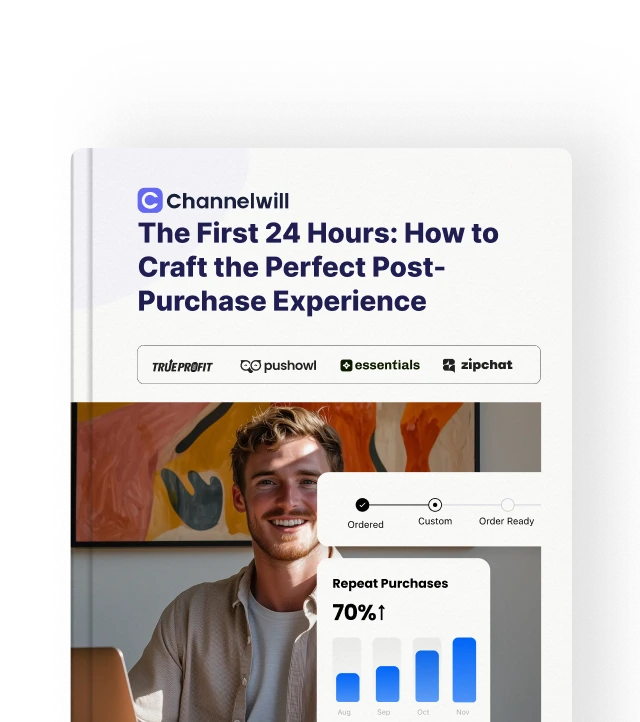With 2025’s retail ecommerce sales expected to surpass the $4.1 trillion mark, this is the perfect time for potential affiliates to join the affiliate world. Recent online shopping trends indicate that a Shopify affiliate program will not just drive traffic to the platform but also unlock higher earning potential and a competitive edge for ecommerce brands.
However, affiliate marketing is not an overnight get-rich-quick strategy. This article will help you understand how Shopify’s affiliate program works, unveil the benefits of promoting with Shopify, and guide you in setting up a successful affiliate program.
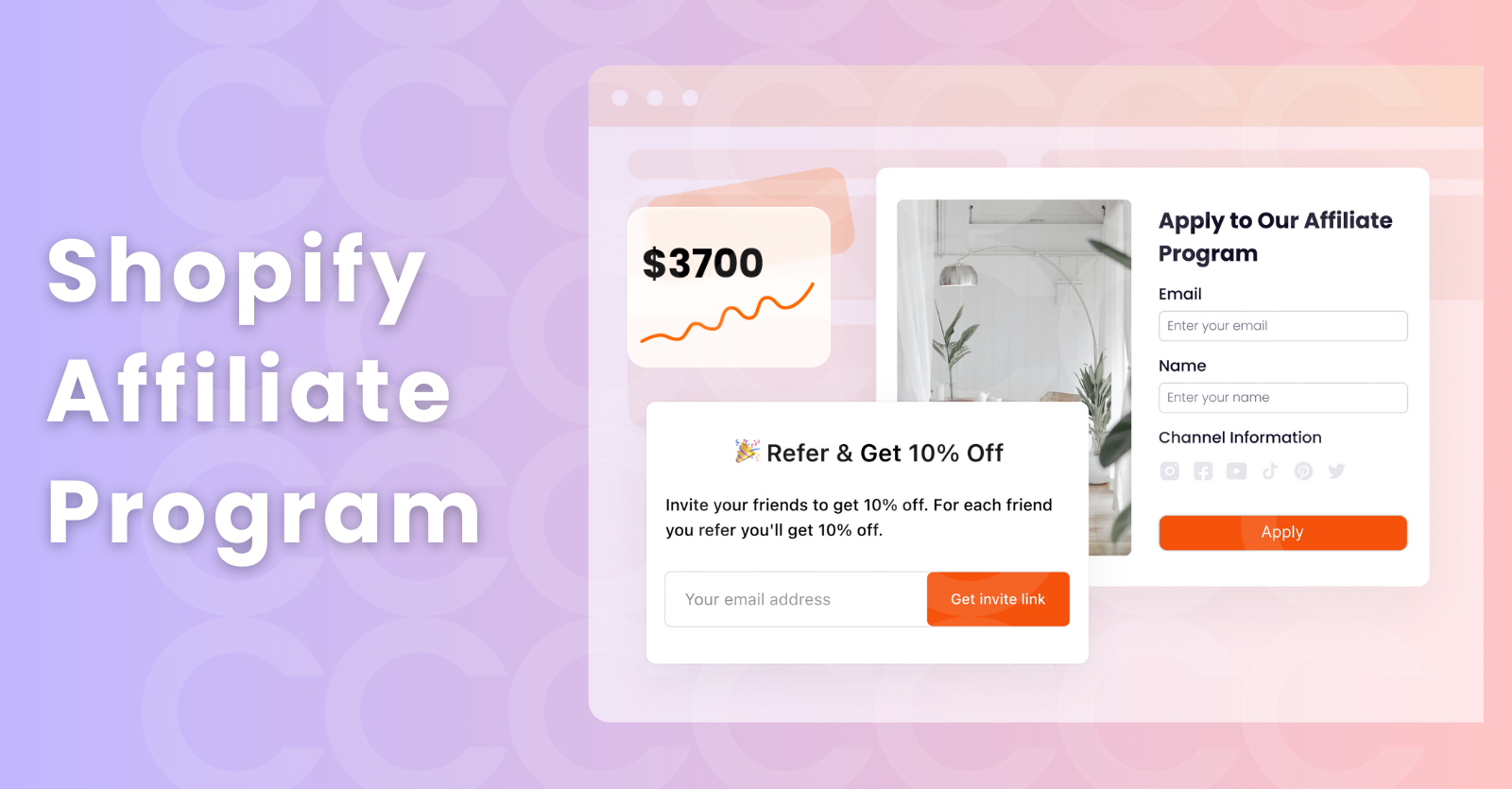
What is Affiliate Marketing?
Affiliate marketing is a performance-based marketing strategy in which creators, influencers, and entrepreneurs earn money by promoting a product or service for a retailer. Affiliate marketers make a commission on sales or referrals, providing a stable way to monetize their content.
Operating like a reward-based system, as an affiliate, you need no upfront costs to benefit. With the right strategy and ability to promote Shopify effectively, you can earn recurring commissions by driving the brand’s awareness.
Compared to other forms of marketing, affiliate marketing is result-driven. Your commission is tied to specific customer outcomes, such as generating website traffic, lead generation, or facilitating actual affiliate sales.
Here‘s how it works:
As an affiliate, you promote your unique affiliate link to your audience, encouraging them to visit your merchant’s store. For every successful referral, you get a small commission after the merchant tracks every purchase made via the referral link, creating a win-win situation.
Not sure whether affiliate marketing is the right fit for you?
Generating website traffic and maintaining customer engagement is not getting any simpler, not with the growing number of online merchants. But with proper strategies and partnering with the right merchants, you can improve your reputation as an affiliate partner and earn more revenue.
What is an Affiliate Marketing Program?
An affiliate marketing program is a marketing strategy where merchants partner with influencers for mutual benefits. Through the influencer, the store owner enjoys the credibility and trust established with potential customers. In return, the affiliate gets a cut from every successful purchase. However, the success of an affiliate program depends on the platform you use.
Shopify is an eCommerce platform that has many resources to support successful affiliate programs. From finding the best affiliate partners to one-click program launches and tracking clicks, sales, and referral links, Shopify makes everything easy.
Let’s explore the details of Shopify’s affiliate program for a clearer understanding.
How Does the Shopify Affiliate Program Work?

The Shopify affiliate program is a partnership opportunity for influencers, content creators, and businesses looking to earn by referring new merchants to Shopify. While the program is free to join, you’re more likely to succeed if your audience includes established online stores, aspiring entrepreneurs, startups, or businesses interested in Shopify’s solutions.
Here’s how it works:
- Apply to Join the Shopify Affiliate Network: To become an affiliate, you need to have a stable online presence with an established audience. This could be through an active website, blog, YouTube channel, or other social media platforms. Experience using the Shopify app store and previous content related to Shopify published on your networks can also enhance your application.
- Choose Your Plan: Once accepted into the program, select a plan that suits you. The Shopify Plan referral allows you to earn for every new customer (merchant) who signs up for a Shopify plan. Alternatively, the Shopify POS Pro plan pays you for every customer who purchases the POS Pro, an advanced Shopify offering.
- Track Your Performance: Use Shopify’s performance tools to monitor your referral efforts and content development. This will help you attract and convert more traffic into Shopify signups.
Whether you’re an individual or a business, the Shopify affiliate program offers a valuable opportunity to monetize your audience while promoting a platform that can benefit them.
Why is Affiliate Marketing Important for E-Commerce Brands?
According to Statista, affiliate marketing in the United States alone is expected to grow to $12 billion in 2025. E-commerce brands can leverage affiliate marketing to enhance brand awareness and revenue generation, making it a powerful strategy for business growth.
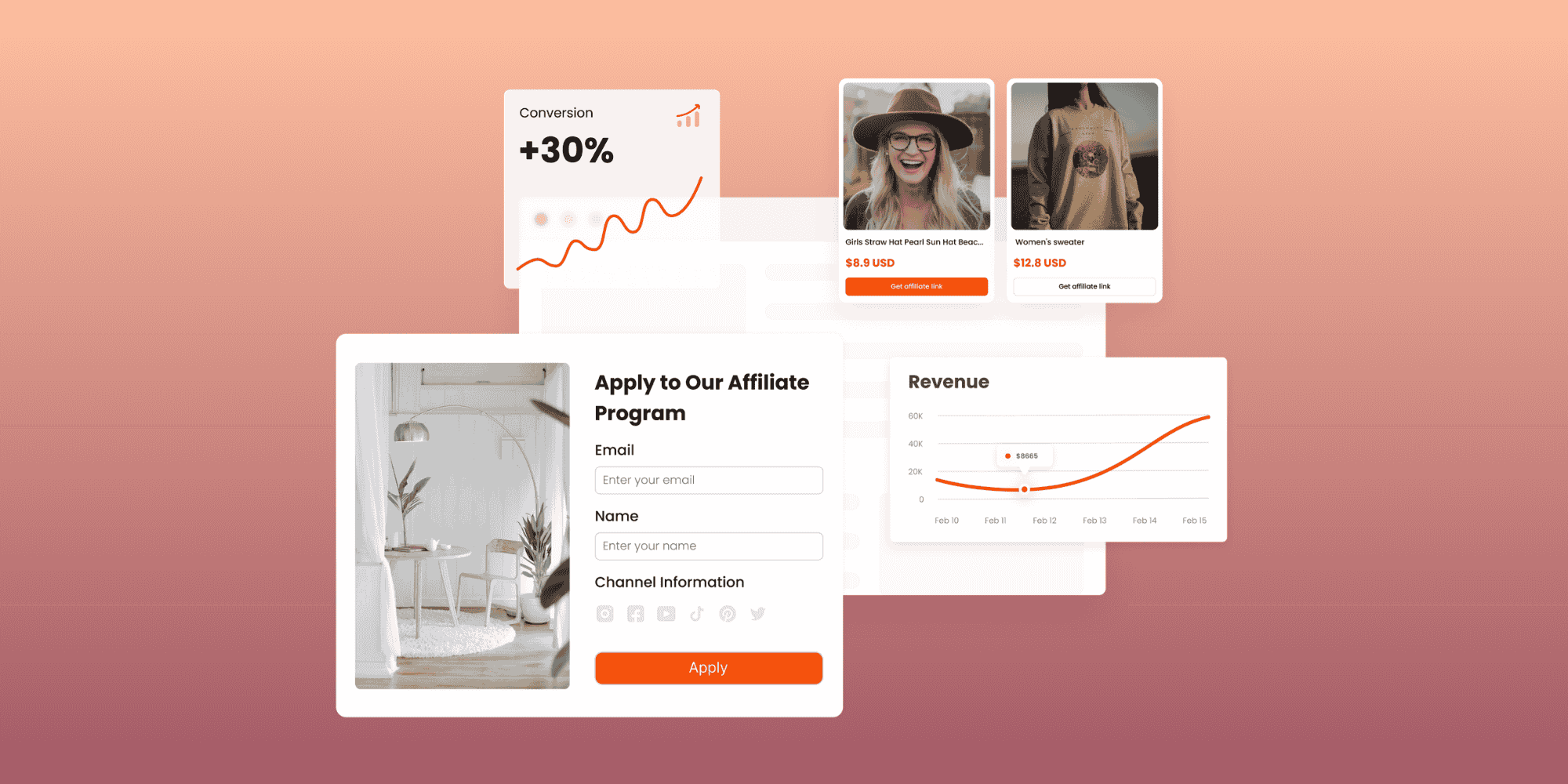
Imagine no upfront costs, minimal advertising, and a small commission to pay for every successful sale. This is what affiliate marketing delivers. All you do is tap into your affiliate partner’s established audience and grow your sales!
- Broad Reach: No limits on the number of affiliates you can work with; you can reach more people. More visibility across multiple social networks and e-commerce sites means more customers and sales.
- Low Risk: Setting up an affiliate program is cheaper than other marketing strategies. You only pay after actual sales are made so you get value for your investment.
- More Revenue: Affiliate marketing builds brand awareness, brings more visitors, and generates more website traffic. Working with multiple affiliates can multiply this effect and drive more sales growth.
- Full Tools and Resources: Shopify has all the support and resources for affiliates and e-commerce brands, including educational content and dedicated tools for success.
- Multiple Promotion Strategies: Affiliates can use different content creation methods—video tutorials, webinars, or blogs—to promote your products and keep your brand fresh and competitive.
- Valuable Data: Affiliate programs give you data on customer behavior and market trends so you can make informed decisions and increase profitability.
- Trust with Affiliates: Long-term relationships with affiliates build trust and satisfaction and increase the chances of them becoming brand advocates for your business. This strengthens your brand and drives more business.
- Low Overhead: Shopify merchants need no infrastructure to run affiliate marketing. A few affiliates can drive sales and you can grow with no costs and high commissions.
How Much Does It Cost to Set up a Shopify Affiliate Program?
Over 80% of global businesses agree that affiliate marketing is the best for e-commerce websites compared to many other strategies because of the high ROI. These account for 16-20% of retail sales worldwide. But besides the potential returns, how much does it cost to set up a Shopify affiliate program? Let’s break it down.
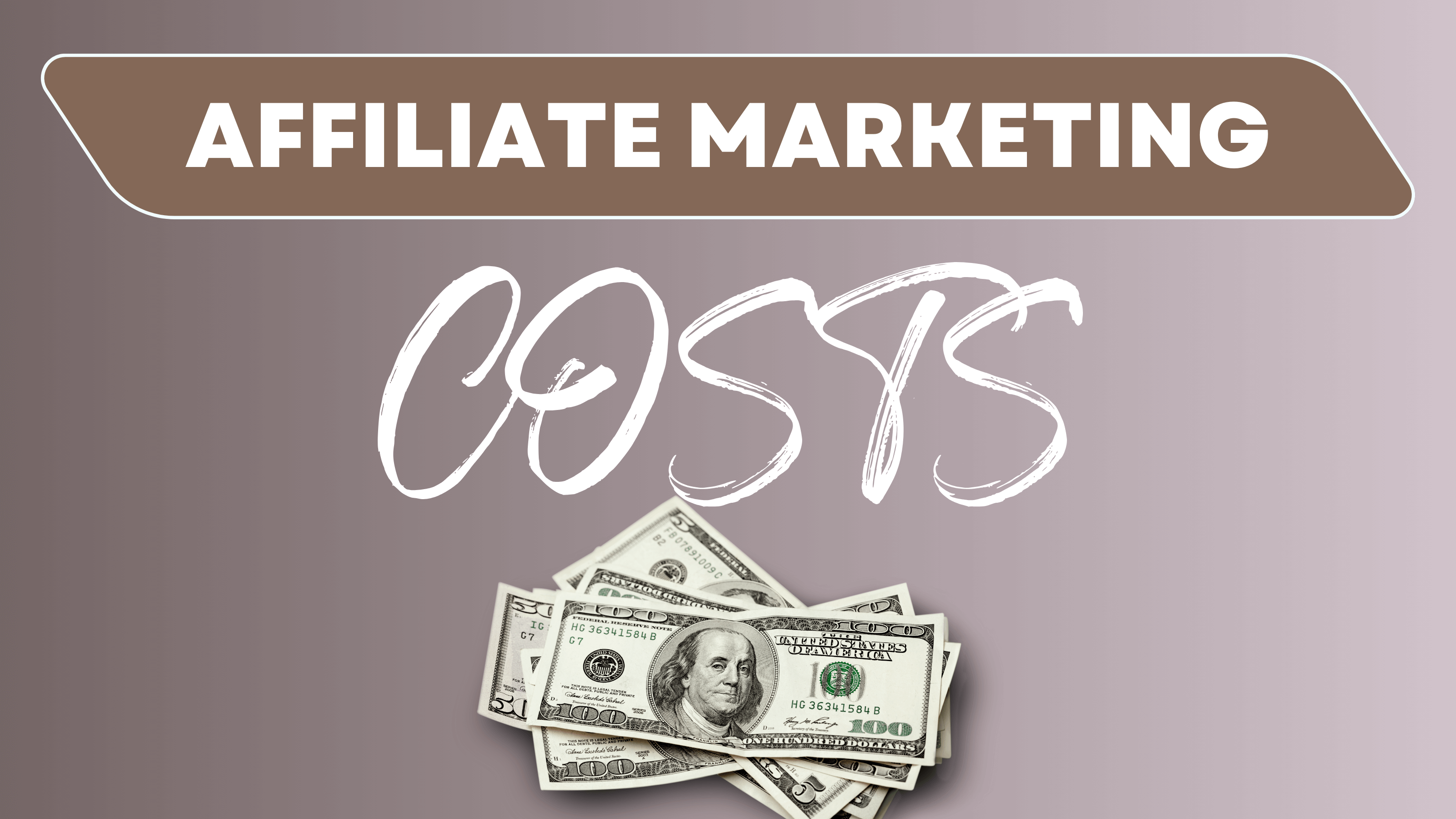
Setup Costs
Shopify has no upfront costs for its affiliate marketing programs. Most of the costs come from the 3rd party apps used to manage the affiliate program. These apps track referral link performance and partner payouts. Shopify has great affiliate program apps that promote your products through paid ads.
These apps usually charge a monthly subscription fee or a small percentage of affiliate sales. The cost ranges from $5 to $129 per month, depending on the affiliate marketing app you choose. Shopify collabs. For example, Shopify Collabs is free to install but charges a 2.9% processing fee on commission payments to affiliate partners.
You also need to consider the commission structure for clear financial expectations. The percentage varies based on sales, pricing, industry, and the overall setup of the affiliate program.
Additional Costs to Consider
Beyond the basic setup costs, many others can impact the start and running of your Shopify referral program. These include:
Training, Support & Incentive Programs:
Introducing bonuses and special rewards for high-performing affiliates will help boost their motivation. But before then, you may need to provide sufficient training programs, which may add to your costs.
Communication & Reporting Tools:
Depending on the complexity of your affiliate programs, you need both communication and reporting tools. Communication tools will help with direct interaction between you and the affiliates, while reporting tools help analyze the program’s effectiveness. These tools ensure a productive partnership where both parties understand what’s working and what needs improvement to maintain a high brand image.
ROI Calculation
The return on investment from a Shopify affiliate program is attractive if it is well-managed compared to traditional marketing.
Affiliate platforms can help in tracking sales and calculating ROI effectively by providing essential tools and resources, such as onboarding affiliates and tracking sales data.
Here’s an example to help you understand better:
Assume you have 5 Shopify affiliates each generating 10 sales valued at $200 each month. If your agreed commission is 10%, your total affiliate commission will be $1000. If your affiliate platform charges $200 per month as operational costs, the total you’ll part with at the end of the month is $1200. But since the total sales amount to $10000, you’ll have considerable returns on investment.
ROI Percentage formula = (Total Sales – Incurred Expenses)/ (Incurred Expenses) x 100%
Filling in the numbers:
($10000 – $1200)/ $1200 x 100% = 733.33%
Steps to Set up a Successful Affiliate Program on Shopify
Are you ready to leverage affiliate marketing to boost your reach and increase sales? You’re in good company! Since 2017, the global affiliate market has grown by an impressive 83%, with projections estimating that spending on affiliate programs will hit $15.7 billion by 2025. It’s clear that affiliate marketing is a powerful growth strategy, and Shopify makes it easy to get started.
To help you tap into this lucrative opportunity, here are straightforward steps to follow to build the foundation for your affiliate marketing success.
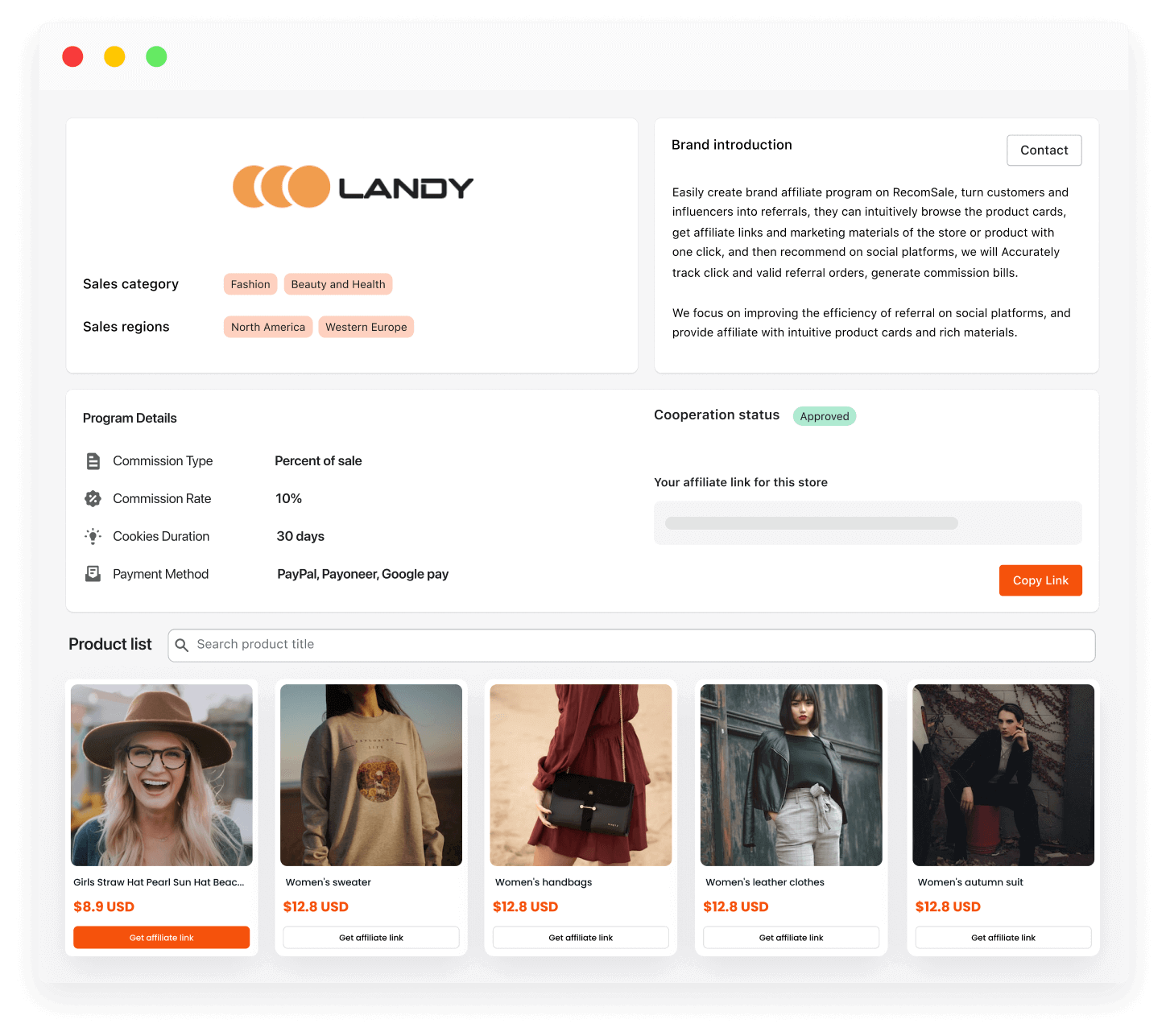
1. Choose the Right Products and Promotions
First, identify your niche market. This includes the products you want to offer and your target audience. The emphasis is, however, on the products you settle for. Choose products that are most demanded by your target audience for an effective marketing strategy.
With the right product, it’s easy to introduce promotions and discounts that will not just attract interested partners but also their affiliate networks to make purchases.
- Create limited-time offers with discounts or flash sales that will call for quick action from the audience.
- You don’t want to miss free shipping, as it’s more appealing to customers. Statista notes that 80% of customers would be influenced by free shipping, especially on domestic online purchases.
- Cashback offers and gifts would also add value for your customers at any time. Beyond the appeal these have for your potential partners, they also encourage the affiliates to promote the products they enjoy.
2. Decide Your Affiliate Pricing and Commission
Affiliate pricing is a key factor that impacts your affiliate marketing program. An affiliate assured of additional incentives to their commission structure is more likely to stay active promoting products than one working on a flat rate basis.
Consider factors such as the marketing partner’s effort to drive sales, the industry’s nature, and your expected small profit margins from the products.
3. Choose an Affiliate Management App
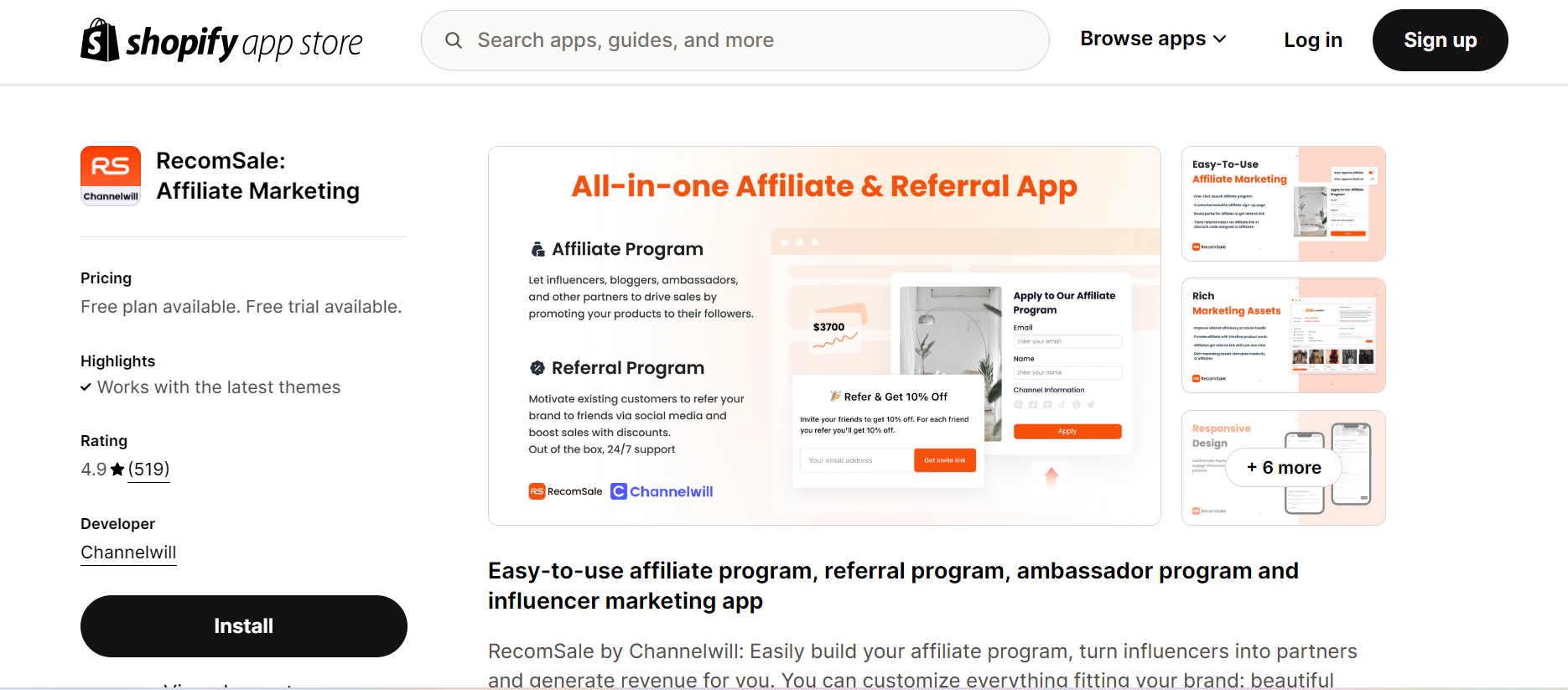
Your affiliate management app contributes greatly to the overall success of the affiliate strategy. One reliable app that integrates seamlessly with your store is the RecomSale, an effective referral and marketing tool. RecomSale simplifies building your own affiliate program by helping you manage affiliates, track performance, and set up effective affiliate campaigns—all without technical expertise.
While it offers a free plan, its paid plans have more enhanced features that you can explore with a 7-day free trial.
4. Recruit Your Affiliates
The success of your affiliate marketing program depends significantly on your recruitment efforts. Whether you’re targeting social media influencers or bloggers, establish specific criteria to ensure your affiliates align with your target market.
Consider factors like platform engagement and the number of followers. While offering incentives to attract partners, also evaluate the quality of their content to ensure it aligns with your brand. Look for affiliates whose audiences are likely to resonate with your products for better engagement.
5. Manage Affiliates
Ongoing support and regular communication are essential for building strong relationships with your affiliates. Keep them informed about the rules and expectations for your affiliate marketing program, including updates on new products and promotions.
Monitor affiliate performance, track sales, and provide immediate feedback when needed. Additionally, offer content ideas to guide affiliates in creating relevant material, especially for new products. Provide tutorials, templates, and pre-written social posts to help ensure that their content aligns with your affiliate program and overall business goals.
Measure and Optimize Your Affiliate Marketing Performance
With your affiliate marketing program already up and running, its success is based on the overall performance of each aspect of the strategy.
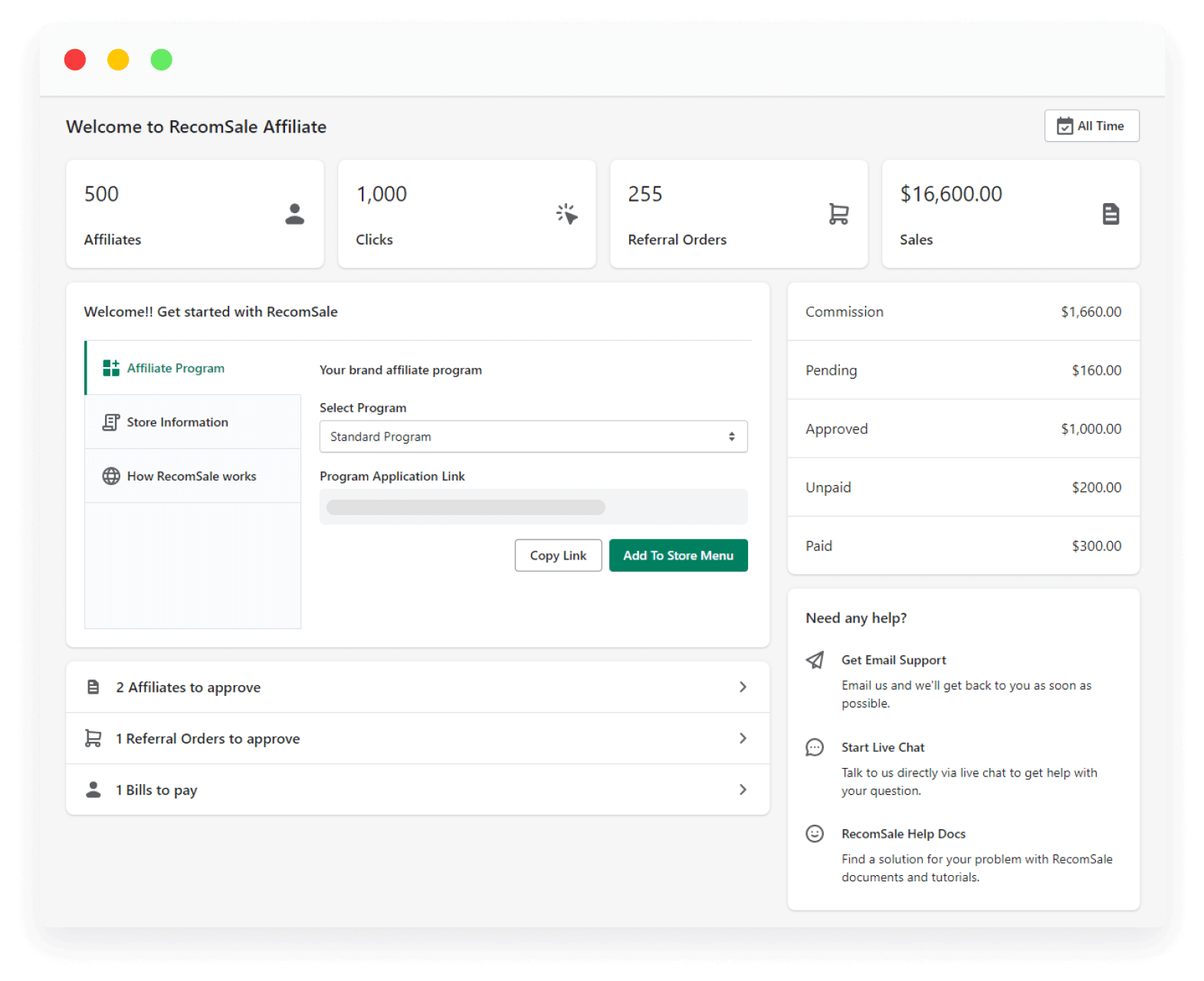
Here is our top 4 metrics list with a bonus for any Shopify website to boost affiliate sales.
- Click-Through Rates (CTR): This is a ratio of how many visitors see your affiliate links to how many actual clicks on them you receive. A higher CTR means your call to action and general content are attractive and engaging.
- Conversion Rates: Once a visitor clicks the affiliate links, they are redirected to your landing page. But how many of them complete the desired action—signing up or making a purchase? Conversion rates help assess not just the traffic you receive but also the effectiveness of the landing page on your Shopify website.
- Average Order Value: This helps you understand the purchase behavior of customers coming from the referral marketing program. In simple terms, it is the average amount a customer spends on a single transaction, and it helps you adjust your affiliate marketing efforts effectively. Following the results here, you’ll understand the affiliates’ performance and customer behavior by evaluating products with more sales.
- Return on Investment (ROI): Tracking your ROI helps evaluate whether your affiliate marketing campaigns are effective or need adjustments. It gives a clear picture of the total affiliate sales you receive as revenue compared to the cost of investment.
Consistent tracking of these metrics helps you evaluate your affiliate networks and improve your program’s marketing efforts. For example, if you have higher click-through rates but lower conversions, it means you need to work more on your landing page, or the products are not as appealing as the audience expected. So, you’ll now optimize and tweak your affiliate marketing strategies by refining your product offers based on your target audience’s behavior.
Additionally, analyzing these metrics helps you understand which affiliates drive the best results. So it’s easy to focus on the most profitable partnerships and optimize your program’s overall performance.
Common Mistakes to Avoid in Affiliate Marketing
About 25% of major brand sales are the proceeds of affiliate marketing. But getting the program in action isn’t that easy, especially with these common mistakes affiliate marketers make.
Partnering with Low-Quality Affiliates or Products:
The success of your Shopify affiliate program is bound to the product and affiliate standards you set. Pushing for low-quality products or partnering with low-level affiliates harms your reputation and undermines your trust in your audience.
Failure to Disclose Affiliate Links:
The FTC mandates that any businesses engaging in referral marketing disclose their affiliate relationships. Beyond the legal obligation, disclosing the presence of an affiliate link in your content demonstrates honesty and builds trust with your audience. It shows them you’re not just running a legitimate business but also assures them of how you value them beyond making a profit.
Promoting Too Many Products at Once:
While it is a fact that 81% of businesses with affiliate marketing programs make over $20000 annually, such success is not just about the number of products you promote. It’s about prioritizing key products and demonstrating how they improve your audience’s lives. So, avoid overloading your Shopify store with too many products that affect your focus. Instead, using engagement metrics, identify and narrow down specific products attracting your audience.
By avoiding these mistakes, you’re more likely to build long-term relationships with a loyal customer base. Just maintain transparency and absolute quality in your affiliate marketing efforts.
Real-Life Examples of Successful Affiliate Marketers
According to WebFX, affiliate marketing is responsible for about one out of every five successful sales, so it’s a worthwhile investment. Find out below how Frankie Bikinis and Juice Beauty were able to drive sales following affiliate marketing.
Frankies Bikinis

The luxury swimwear brand understood the power of social media in driving a profitable affiliate program. Following their partnership with bloggers and influencers who understand and align with their brand’s specificity, Frankies Bikinis has made it from tapping into a larger audience through social media and content marketing.
Hashtags such as #Beachvibes, #Frankiesgirls, #Swimstyle, etc., have helped launch the brand’s product. Brittney Bowles, Director of Marketing and E-commerce, calls it “Building excitement around a release.”
Bowles also acknowledges that leveraging Shopify’s third-party, Launchpad, is a game-changer in their overall affiliate programs. She says the affiliate platform made it too easy to launch new products. At one point, she confesses how it felt like “we were missing something” as Launchpad was just too straightforward and, to their surprise, delivered all its Shopify store promises. During one launch, the company earned about $150,000 in an hour, with some products selling out in just two minutes. A success they credit to effective affiliate marketing campaigns.
Juice Beauty
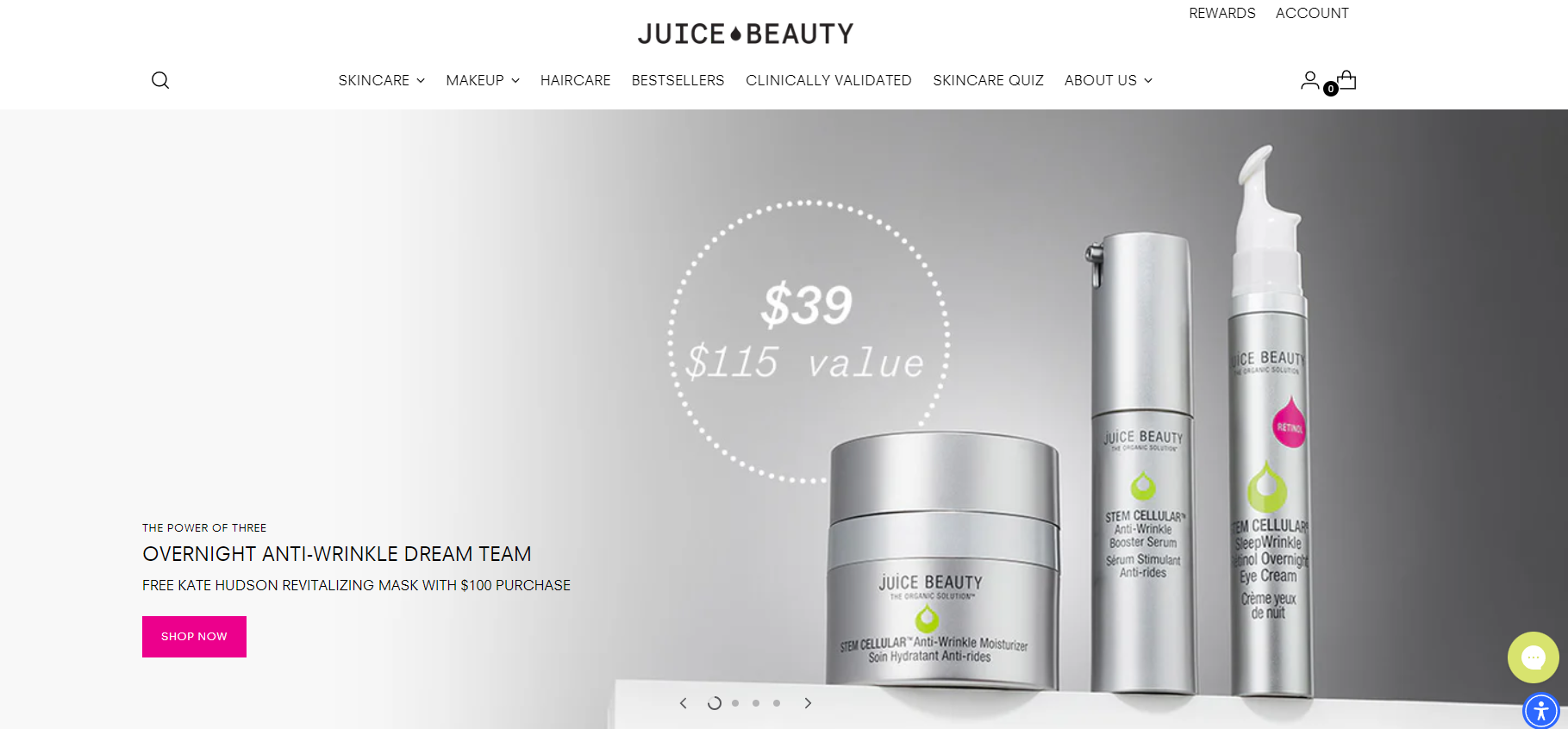
As you’d expect from a skincare and beauty brand, California’s Juice Beauty takes advantage of Shopify’s affiliate strategy to widen its audience and establish itself as a leading beauty brand. While it pays affiliates a 6% commission, discounts and promotions have proven instrumental in driving more revenue and building a loyal customer base.
The brand’s CEO, Karen Behnke, notes that leveraging an affiliate marketing strategy has not just helped Juice Beauty collaborate with the right affiliates; it has also helped them build strong relationships with their brand ambassadors and influence. This has gained them a wider audience reach, improved brand image, and earned them trust and credibility among their potential customers.
Shopify Affiliate Marketing: Bottom Line
The Shopify affiliate program remains a promising avenue for merchants looking to monetize their online presence with an active website. But it takes the right strategies, from choosing the right affiliates to promoting quality, for potential partners to succeed.
As you continue building your Shopify affiliate program, remember to stay away from any practices that may affect your audience’s trust or weaken your affiliate networks. Always monitor and track your performance regularly to keep your affiliate strategy effective.
Shopify Affiliate Program FAQ
As a Shopify merchant, there’s an opportunity to earn commissions by sharing insights about the Shopify affiliate program. By recommending the platform through your online channels, you can benefit when new merchants sign up for paid plans.
Yes, the Shopify affiliate program is legit. It’s low-risk and offers a transparent commission structure. Businesses pay a commission after a successful referral, so the only thing you can lose if it doesn’t work for you is time. However, with patience and consistency, it’s easy to tap into a worldwide partnership with thousands of affiliate marketers and make a profit.
To import products from eBay to Shopify, you need an integration app. You need to import the products from eBay to the integration app first, and then you can upload the imported listings to your Shopify store with a few clicks.
Affiliate marketing is ideal for Shopify merchants who are bloggers, social media influencers, or eCommerce enthusiasts. If you have an online presence and understand the eCommerce landscape, promoting Shopify can be a lucrative opportunity to earn commissions by sharing your insights and experiences. For more details, visit Shopify Affiliates.



